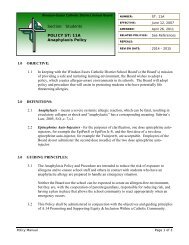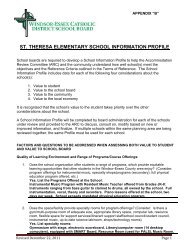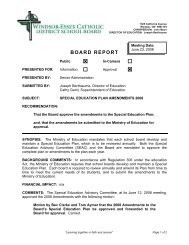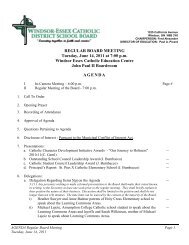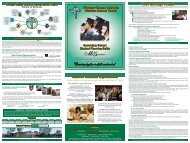Guide for Hosts
Guide for Hosts
Guide for Hosts
Create successful ePaper yourself
Turn your PDF publications into a flip-book with our unique Google optimized e-Paper software.
• Are in unresolved personality conflicts, as a<br />
family or with your students;<br />
• Steals your student’s property; or<br />
• Harasses your student in any way: verbally,<br />
emotionally, physically, or sexually.<br />
In a typical year more than 90% of our students<br />
rate their homestays as satisfactory or better;<br />
many say they love their hosts and don’t want to go<br />
home! Of the less than 10% who request a move,<br />
most have allergies or food restrictions they failed<br />
to tell us about. Of the fraction of students moved<br />
<strong>for</strong> personal reasons, less than 1% requests a<br />
second change.<br />
Medical Emergencies<br />
All students have their own medical coverage; just<br />
to make sure they are prepared <strong>for</strong> any emergency,<br />
please ask to see their insurance policies and cards.<br />
If they don’t have, or are unaware of their medical<br />
insurance please notify CHI immediately.<br />
In case of a medical emergency, please react as you<br />
would with your own children or friends. After you<br />
take whatever immediate action you consider<br />
appropriate (including calling 911), please call the<br />
CHI Emergency Line listed at the end of this <strong>Guide</strong>.<br />
We have experience and training in handling<br />
emergencies, and we will be there <strong>for</strong> you!<br />
Final Thoughts<br />
Almost every difficulty we ever face in homestay has something to do with communication. It all comes<br />
down to a simple problem: in the first weeks of a homestay (and sometimes longer), your students will<br />
ordinarily find it very hard to express themselves—and to understand you—even when it comes to simple<br />
wants and needs (and feelings).<br />
This may cause a student (and us) to feel defensive, vulnerable, incompetent, or frustrated. These feelings<br />
can all be compounded by a student’s limited vocabulary—a student may, without meaning to, sound blunt,<br />
stubborn, insensitive, or selfish. Worse yet, the student might not want to say anything at all.<br />
Here are some things to keep in mind:<br />
• The hardest thing <strong>for</strong> students from some cultures to do is to complain. If your student doesn’t feel<br />
com<strong>for</strong>table expressing herself, she’ll be reluctant to bother you. She may say things are “fine” rather than<br />
risk insulting you. Make things easier by being patient and being as precise as possible. Ask specific<br />
questions in order to identify problems and concerns, about everything from laundry to dinner.<br />
• Sophisticated speech is part of being well mannered, and it is exactly this sophistication that your student<br />
is here to pursue. Be patient if they’re not there yet.<br />
• Quiet behavior does not mean that they are not enjoying the experience, talk to them and see how they’re<br />
doing;<br />
•Most students experience some degree of culture shock and homesickness, and it often does not set in until<br />
a few weeks into their travels. Each person is different, so there is no panacea. Be understanding.<br />
© 2011 CHI/CANADA HOMESTAY INTERNATIONAL 7



